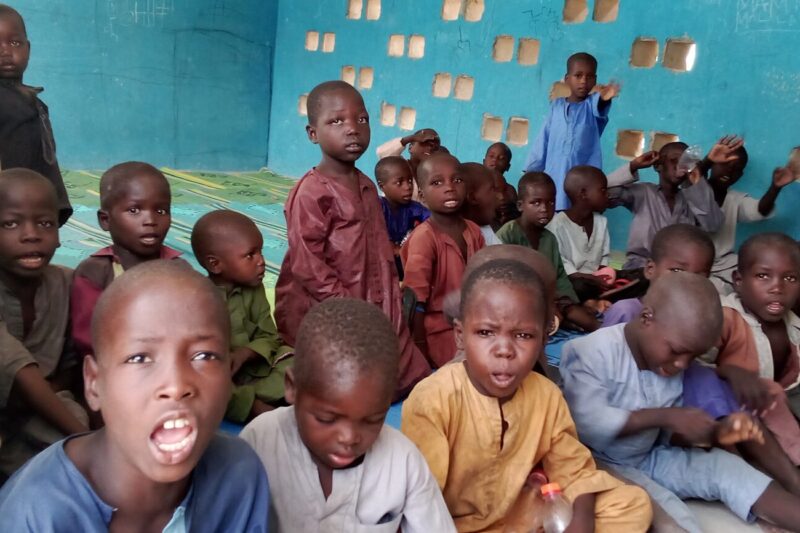Thirteen ‘low-risk’ surrendered insurgents – members of the ‘hybrid forces’ working side by side with Nigerian Armed Forces – have fled with rifles and motorbikes.
Thirteen “low-risk” repentant insurgents, who underwent rehabilitation and reintegration – and became members of the “hybrid forces”, working alongside Nigerian Armed Forces in counterinsurgency operations – have escaped with weapons and motorbikes.
They are among more than 160,000 former fighters who have surrendered to the government since 2021 under the Borno Model, an amnesty progamme that focuses on deradicalisation, rehabilitation, reintegration and resettlement into normal society.
After their escape, the men released a video in which they brandished the stolen rifles.
They reportedly called Abdullahi Ishaq, a retired brigadier-general who promoted the Borno Model programme and a special adviser to the Borno State government on security matters, threatening to unleash more violence.
In a statement issued by the Borno State Ministry of Information and Internal Security and sent to RNI, the government confirmed the escape but claimed only six former fighters had absconded and they were unarmed.
“The attention of the Borno State government has been drawn to a recent escape of six repentant insurgents that had surrendered to the Borno State government and were processed under the Borno Model of Reconciliation, Peacebuilding and Development.
“The Borno State government is fully aware of the incident and remains committed to collaborating with the relevant agencies to track and arrest the escapees.
“These repentant returnees are part of a cohort of more than 20,000 militants who were recently documented, processed, profiled and categorised as ‘low risk’ in terms of their mental state, vulnerability to violent extremism, propensity for psychotropic substance abuse and probability of relapse to violence.
“These repentant insurgents escaped unarmed and are being tracked down.
“Regarding the rumours that the absconders escaped with government arms, preliminary investigation reveals that this was not true.
“Terrorists and other violent non-state actors have historically acquired weapons from various subterranean sources, which they use in their propaganda videos. Therefore, seeing weapons in such videos does not imply they belong to the government.
“It is important to note that the six absconders are a very small and insignificant number when compared with the more than 20,000 repentant individuals who were successfully processed and domiciled in the exit programme.”
Usman Tar, the Commissioner for Information and Internal Security, said in a statement released on Wednesday, October 9, that the men had been recently documented and profiled after surrendering under the Borno Model.
“The Borno State government is fully aware of the incident and remains committed to collaborating with the relevant agencies to track and arrest the escapees,” Tar said.
He maintained that the surrendered insurgents escaped without weapons.
In July this year, Modu Alhaji Massa, the permanent secretary of the Ministry of Information and Internal Security, confirmed to RNI that the government had included an undisclosed number of surrendered insurgents into the “hybrid forces”.
These fighters were working side by side with Nigeria Armed Forces, he said, conducting joint operations to locate and destroy hideouts and enclaves, seize weapons caches, rescue hostages and fight the remaining members of the Jamā’at Ahl as-Sunnah lid-Da’way Wa’l-Jihād (JAS), more commonly referred to as Boko Haram, and the Islamic West Africa Province (ISWAP).
He said the repentant fighters had switched sides and were taking part in ongoing counterinsurgency operations in the Lake Chad Basin region, fighting alongside soldiers and other security operatives.
“The hybrid forces are assisting the military and their support has been yielding positive results,” Massa told RNI at the time, adding that the former combatants used their insider knowledge to help rout out the remaining fighters.
The military is said to provide the former combatants with sophisticated rifles, ammunition and motorbikes to enable them to take part in counterinsurgency operations. Sources said the weapons were recovered from them after every operation.
In an exclusive interview with Premium Times, Malik Samuel, a senior researcher with Good Governance Africa, said eight former combatants attached to military operatives in the Mafa Local Government Area escaped on September 1. Five others followed the next day.
Samuel has a deep understanding of insurgent groups in northeastern Nigeria and the Lake Chad Basin region.
He said the men had fled to Darul Gazuwa, “a renegade Boko Haram faction” led by a senior commander, Alhai Kale. The group was known to attack villagers in the Bama, Konduga, Mafa and Dikwa local government areas.
Samuel said the group specialised in kidnapping-for-ransom and highway robbery, adding that “economic reasons contributed to the recidivism.”
Sources said the escapees might have fled because the Borno State government had not fulfilled its promises.
Kachalla Grema Kyari, a Lake Chad region-based security observer, told RNI that the report of surrendered fighters escaping with weapons was not a surprise to him because experts had warned several times about the potential risk of integrating former combatants into the so-called “hybrid forces” assigned to work with the military in the fight against insurgents in the northeast region.
“It’s too early for the government to consider the former fighters as hybrid forces,” Grema said, adding that this was not the first time “repentant” combatants had escaped with weapons and ammunition taken from the military.
“It has happened several times. But you hardly see them on the news. There have been many cases in places such as Konduga, Mafa, Dikwa and Bama and other local government areas in Borno State.”
Kyari said some of the key factors driving the former fighters to escape included poverty, poor welfare and unfulfilled promises made by the government, including skills acquisition to enable them to work and earn a livelihood.
“They are supposed to receive stipends and are promised a better life, including being fully reintegrated into society. They have high expectations of receiving assistance from humanitarian aid organisations, the government and society. Unfortunately, not many of these promises have been kept.”
Recently, surrendered insurgents at the Hajj Camp – a government-run deradicalisation facility – held a protest over the non-payment of their monthly stipend by the government. They blocked a major highway linking Maiduguri, the capital of Borno State, to other parts of the country, as well as the neighbouring states of Chad, Cameroon and Niger.
The repentant fighters and their families denounced poor planning by the government and demanded better welfare and a clear reintegration procedure.
“This is an obvious indication that there is need for the government to fulfil all its promises,” said Kyari.
“I think it is now time for the government and the security agencies to review the whole process of dealing with ‘repentant’ combatants and their co-option into the fight against the insurgency to prevent future occurrences.”
MAMMAN MAHMOOD








